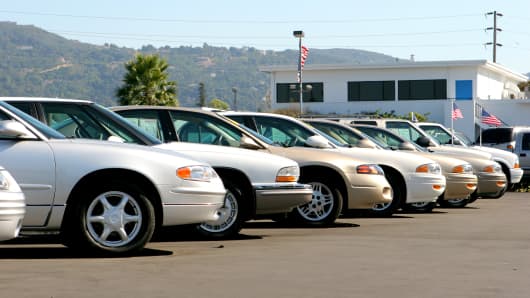
Thinking of donating your clunker to charity for a nice tax deduction? Proceed with caution.
The gifting of used cars to "charities" has become a favorite way for Americans to dispose of unwanted vehicles. And why not? You can avoid the headache of selling or junking the car, help a charitable cause and lower your tax burden all at the same time.
Unfortunately, the experience is rarely, in reality, such a win-win situation. Not only do charities typically see little of the proceeds from a used car sale, but donors can run afoul of the taxman if they're not careful.
"At the end of the day, donating a used car could be the least cost-effective way to give to a charity," said Stephanie Kalivas, an analyst with CharityWatch, an organization that monitors the charitable giving industry.
The problem is the industry is riddled with fraud and misrepresentation. Attorneys General from multiple states have investigated car donation charities for false advertising and self-dealing. Many of the organizations are for-profit intermediaries that give token contributions to a participating charity. Others misrepresent the cause they support and/or give low percentages of their funds raised to their stated targets.
Kars4Kids, for example, a New Jersey-based organization with an insipid yet highly successful advertising jingle, has received more than 450,000 car donations, according to its website. The organization, however, got a D rating from CharityWatch because it distributes less than 50 percent of the money it takes in and because, despite a national advertising campaign, it fails to adequately disclose that the money goes to benefit Jewish children only, and almost exclusively in the New York/New Jersey area.
"They're not transparent about what they do," Kalivas said. "A lot of these organizations mislead the public, and people need to be careful."
Wendy Kirwan, director of public relations for Kars4Kids, said the costs of marketing and operating the car-donation program are high but that because the organization processes donations in-house, more money goes to its charitable work than others who use third parties. She also said that while the catchy advertising jingle doesn't spell out which kids benefit from the charity, the information is readily available on their website kars4kids.org. "This is an innovative way to support charity in a way that helps the charity and the donors," said Kirwan. "A lot of people wouldn't otherwise be donating to charity if it wasn't with their car."
For people solely looking to dispose of an unwanted car for which they won't take a tax deduction, it may not seem to matter what happens to the vehicle and who benefits. Kalivas, however, suggests that charities would be much better off if people sold their cars themselves and donated the proceeds, or simply called up charities they know to find out if they have car donation programs.
If the car in question is valuable and you plan to take a deduction for it, protect yourself. Individuals donating cars can inadvertently mark themselves with big red flag for Internal Revenue Service auditors.
When donating a car, here are eight key things you should consider to maximize the benefits to charity and minimize the risk to yourself.
1. Research the charity you plan to give it to. If it doesn't have 501(c)(3) non-profit status with the IRS, it is not a charity and your donation is not tax-deductible.
2. Pick efficient charities to give to. There are multiple organizations such as CharityWatch that evaluate charities and rate them for efficiency in supporting their causes.
3. Itemize. To take a tax deduction for a car donation, you have to itemize deductions on your return. There are detailed rules about the amount you can claim. Taxpayers can deduct the full market value of a donated car under three circumstances: The charity uses the car in its operations; it materially improves the vehicle to sell or use it; or the charity donates or sells it to a needy person for below market value. Otherwise, you can only deduct what the charity receives as proceeds from selling the car.
4. Get a receipt. Make sure to get a receipt from the charity for the vehicle and eventually a document certifying how much the vehicle was sold for. Charities are required to provide that document within 30 days of selling the car.



No comments: